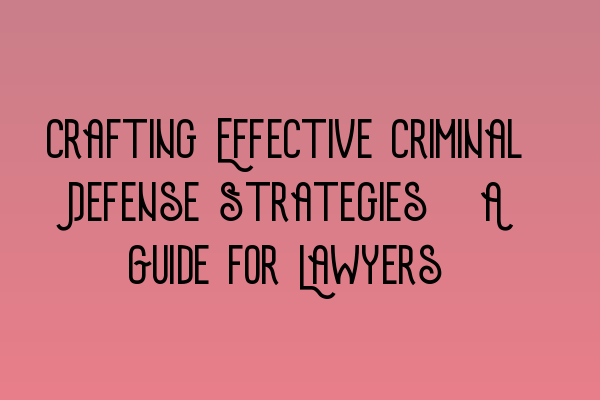Crafting Effective Criminal Defense Strategies: A Guide for Lawyers
As a lawyer practicing criminal law, your ultimate goal is to ensure that your clients receive a fair trial and the best possible outcome. To achieve this, it is crucial to develop effective criminal defense strategies tailored to each case. In this guide, we will explore key considerations and steps to help you craft compelling defense strategies that strengthen your client’s position in court.
Understanding the Case
Every criminal defense strategy starts with a thorough understanding of the case. Begin by reviewing all available evidence, witness statements, police reports, and any other relevant documentation. This will help you identify the strengths and weaknesses of the prosecution’s case and potential avenues for defense. It is advisable to consult with your client in detail to gather any additional information or insights.
Identifying Legal Issues
Once you have a firm grasp of the case, it’s time to identify the legal issues at hand. Analyze the charges against your client and research the corresponding criminal laws, statutes, and precedents. This will help you assess the merits of the case and determine the potential defenses available. Pay close attention to any constitutional rights violations, procedural errors, or lack of evidence that could be used to challenge the prosecution’s case.
Developing a Case Theory
A strong defense strategy requires a compelling case theory. This is the overarching narrative that presents your client’s innocence or justifies their actions. Craft a theory that aligns with the available evidence and resonates with the judge and jury. It should highlight the weaknesses in the prosecution’s case while offering a plausible alternative explanation or casting reasonable doubt on the charges.
Evidence Gathering and Preparation
Evidence plays a pivotal role in a criminal defense strategy. Identify and gather all relevant evidence that supports your case theory. This may include physical evidence, expert opinions, alibi witnesses, or character references. Thoroughly analyze and organize the evidence to present it effectively in court. Prepare your witnesses for cross-examination and anticipate potential challenges from the prosecution.
Negotiating with the Prosecution
In some cases, it may be beneficial to negotiate with the prosecution for a plea deal or reduced charges. Assess the strength of your defense strategy and consider the potential outcomes of a trial. Engage in open and honest discussions with the prosecutor to explore possible resolutions that protect your client’s interests. If a favorable agreement is reached, carefully explain the implications to your client and seek their consent before proceeding.
Courtroom Presentation and Advocacy
When it comes time for trial, ensure that your defense strategy is presented in a clear, concise, and persuasive manner. Use compelling storytelling techniques to engage the judge and jury, emphasizing the key points that support your case theory. Cross-examine the prosecution’s witnesses effectively, highlighting inconsistencies and credibility issues. Maintain professionalism, but be confident and assertive in your advocacy for your client.
Continual Assessment and Adaptation
A criminal defense strategy requires continual assessment and adaptation throughout the legal proceedings. Stay updated on any new developments, evidence, or case law that may impact your defense strategy. Be prepared to adjust your approach based on feedback from the judge and jury during the trial. Regularly communicate and update your client on the progress of their case, allowing them to actively participate in strategic decision-making.
Crafting effective criminal defense strategies is a complex endeavor that requires legal expertise, attention to detail, and a deep understanding of the unique circumstances surrounding each case. By following these steps and integrating them into your practice, you can enhance your ability to provide exceptional legal representation for your clients.
For additional resources and preparation materials for the SQE exams, check out the following articles:
- SQE 1 Practice Exam Questions
- SQE 1 Practice Mocks FLK1 FLK2
- SQE 2 Preparation Courses
- SQE 1 Preparation Courses
- SRA SQE Exam Dates
Good luck in your legal practice and SQE exam preparations!
